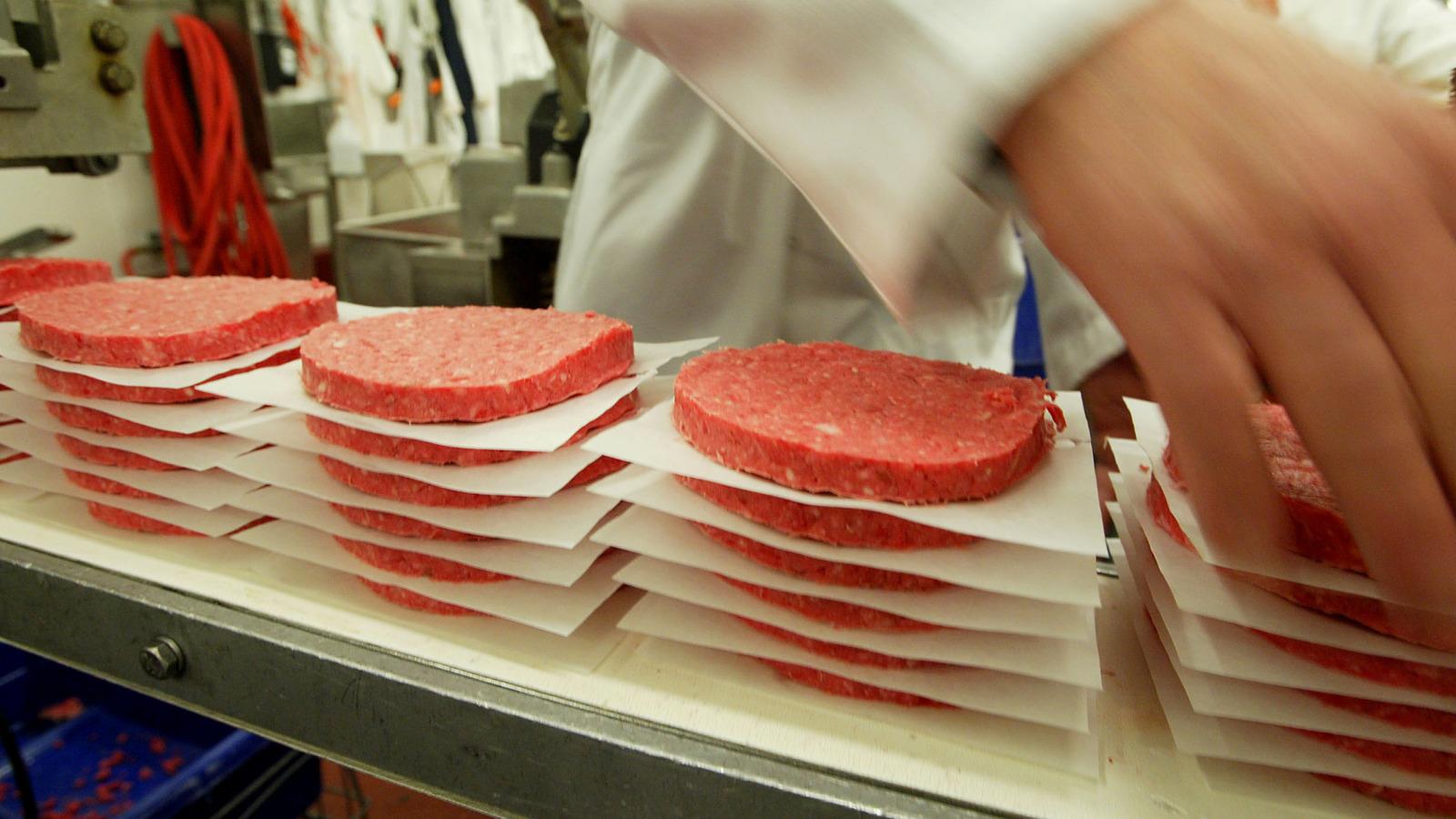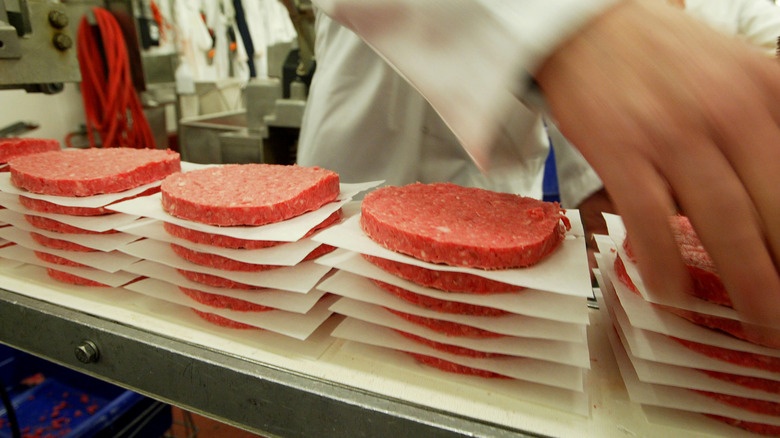
Justin Sullivan/Getty Images
When you hear about food recalls, you might immediately picture grocery store aisles emptied overnight and frantic shoppers double-checking their pantries. But the grocery store isn't the only place food can turn from comforting to concerning. Plenty of recalls unfold behind cafeteria counters, in restaurant kitchens, and at the occasional Boy Scout campfire — because microbes don't care if you're earning a merit badge.
These recalls happen for all kinds of reasons, from metal-infused pork patties in school lunches to misbehaving "drunken chicken" at a restaurant. Some incidents were resolved with little harm, while other recalls were connected to tragic events, like a deadly Listeria outbreak lurking in places meant to heal, not harm.
Each year in the United States, foodborne illnesses claim thousands of lives and sicken millions more. The USDA's Food Safety and Inspection Service calls this "a preventable public health challenge." The recalls on this list remind us just how much work there is to do. While there are plenty of strange food recalls out there, many recalls that never reached supermarket scanners came from usual suspects like E. coli and Listeria. Others were also common causes of recalls, like undeclared allergens and contamination from foreign matter. From elementary school kitchens to high-end restaurants, these recalls prove that contamination doesn't check the venue before it strikes.
Undisclosed allergens in ready-to-eat chicken

Deskcomm/Getty Images
Custom Food Solutions' Drunken Chicken, a spicy tomato and beer sauce dish, sounds delicious, but it had some serious labeling issues in early 2025. The frozen, ready-to-eat product contained egg and sesame, two major allergens that can trigger serious reactions in some people. But those ingredients weren't listed on the packaging. For anyone with food allergies, this kind of mislabeling can be dangerous, turning a simple dinner into a potential emergency room visit.
The USDA's Food Safety and Inspection Service noticed the issue during routine labeling review activities. After discovering the undeclared allergens, Custom Food Solutions recalled over 100,000 pounds of chicken that had been distributed to restaurants in Indiana. The restaurants were told to throw out or return the product, and, thankfully, there were no reports of any allergic reactions. Mislabeled packaging is probably not the kind of buzz Drunken Chicken wants to be known for, but at least this particular chicken sobered up before it could cause any real trouble.
E.coli in frozen ground beef ruins Boy Scout camp
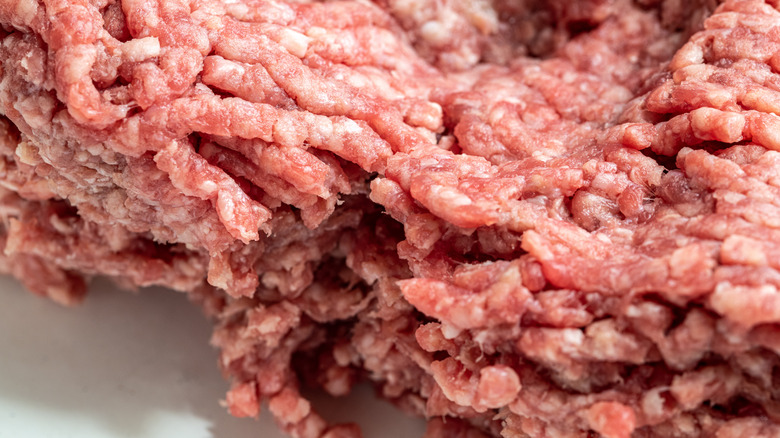
Yalcinsonat1/Getty Images
What was supposed to be a summer of s'mores and merit badges at a Virginia Boy Scout camp in 2008 turned into an unwelcome survival challenge. More than 70 campers got sick, over 20 tested positive for E. coli, and eight ended up in the hospital. Campfire songs were put on hold while the camp temporarily shut down.
Public health officials visited the camp to investigate. E. coli can lurk anywhere, from unwashed produce to a contaminated swimming hole. Though officials recommended some changes to the camp's food handling and storage practices, the ultimate culprit was found in frozen ground beef.
The meat came from California-based S&S Foods. Once the company got the heads-up, it worked to correct the situation and uncover the cause as it quickly recalled over 150,000 pounds of meat — enough for plenty of campfire cookouts. Packed in 30-pound boxes full of 1-pound beef bricks, the product was never meant for grocery store shelves. Instead, it went out to restaurants and was intended for institutional use, like the unlucky Boy Scout camp.
Metal makes its way into pork patties

Ezume Images/Shutterstock
In 2018, Ganaderos Borges, Inc. had to recall nearly 15,000 pounds of pork patties after a school reported finding an unexpected ingredient — metal. Definitely not part of a balanced diet (unless maybe you're a robot). The meat came from a family-run farm in Puerto Rico. It was packaged in 10-pound boxes, each holding 54 raw pork patties intended for institutional use.
Fortunately, the potentially tainted patties were flagged before becoming an unplanned source of iron intake for students. The USDA's Food Safety and Inspection Service jumped in quickly after the complaint came in. The recalled patties were not part of the National School Lunch Program, but schools — not grocery stores — were still on the receiving end. Authorities advised institutions to either return or throw out any remaining boxes stored in freezers.
Foreign objects in food are one of the top causes of food recalls, and with all the equipment involved in modern food processing, sometimes metal is the foreign object. Despite how often it happens, serious injuries from metal contamination are rare. Thankfully, that was the case with the Ganaderos Borges pork patties recall, which has been completed.
Listeria lurking in hospital shakes
Tracking the source of a Listeria outbreak can be difficult. Symptoms can show up from the same day to a full 10 weeks after eating contaminated food. With such a long timeframe, most people wouldn't think twice about something they ate weeks ago — especially if it was a supplemental shake from a hospital.
After investigating illnesses dating back to 2018, the FDA and CDC finally zeroed in on 4-ounce cartons of Lyons ReadyCare and Sysco Imperial frozen supplemental shakes. Made by Prairie Farms Dairy, Inc. in Indiana, these shakes were distributed to hospitals and long-term care facilities nationwide. By May of 2025, 42 people in 21 states had fallen ill, 41 were hospitalized, and sadly, 14 lost their lives. Environmental swabs from the Prairie Farms plant tested positive for the outbreak strain, confirming the connection.
As soon as Lyons Magnus learned of the issue, the company worked with Prairie Farms, Sysco, and the FDA to pull the contaminated shakes from circulation. The recall, initiated in February of 2025, covered a variety of shake flavors with best-by dates extending into February 2026. While the shakes never hit grocery store shelves, the ripple effect was still devastating, especially for vulnerable people already in care facilities. The shakes were meant to support recovery. Instead, they became a hidden threat lurking for years. Some relief finally came by May 16, 2025, when the CDC declared the outbreak over and the FDA closed its investigation. Unfortunately, the tragic consequences are ongoing, especially for families who lost loved ones.
Wood in Campbell's frozen soup

Nicholas J Klein/Shutterstock
We might think of Campbell's as that warm bowl of comfort waiting for us at home, but the soup giant also spoons up a wide-reaching foodservice business. Unfortunately, some of those restaurant soups ended up in hot water when they became the subject of a public health alert. A polarizing herb that tastes either delightfully refreshing or disgustingly soapy, depending on your genes, was stirring up trouble. But regardless of your cilantro preferences, everyone would agree woody cilantro doesn't belong in food. Unfortunately, cilantro potentially contaminated with wood ended up in a long list of soups.
The soups at risk weren't just your everyday chicken noodle. Frozen Campbell's Chicken Tortilla Soup, Baja Style Chicken Enchilada Soup, Spicy Chicken Nacho Soup, and Verve Wicked Thai Style Soup with Chicken all made the list. But Campbell's confirmed that these were frozen soups destined for restaurants, not the familiar red-and-white cans lining grocery store shelves.
And it wasn't just Campbell's soups. The questionable cilantro made it into other brands, including Sysco and Molly's Kitchen. Various flavors, such as chicken tortilla and enchilada soup, were shipped for institutional use across the Midwest, and they all had to be thrown out or returned. Cilantro might forever remain as one of the most controversial herbs in the culinary world, but we can all agree it should never come with splinter seasoning.
Listeria concerns in frozen cheese manicotti
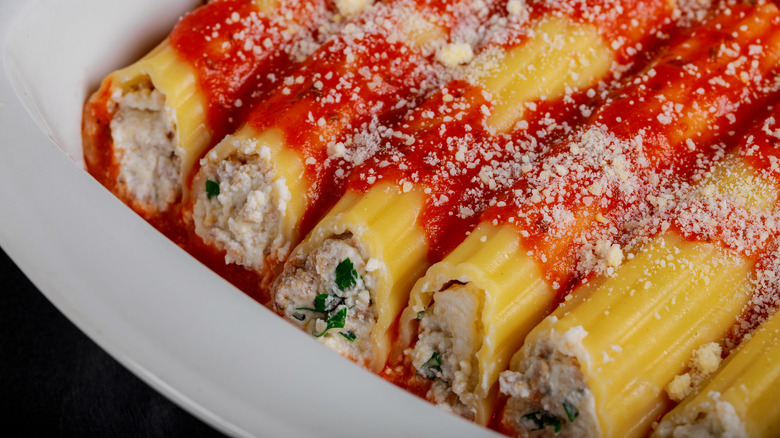
ungvar/Shutterstock
When routine sampling in 2022 hinted at possible Listeria contamination, Caesar's Pasta of Blackwood, N.J. yanked roughly 5,600 pounds of its frozen cheese manicotti. Listeria rarely survives thorough heating, but Caesar's Pasta and the FDA opted for caution, especially since the organism can cause serious illness in vulnerable people and miscarriages in expectant mothers.
The recalled pasta, sold under the Caesar's Pasta and Orefresco labels, came packed in 10-pound bulk boxes meant to be used up by September 28, 2024. Consumers never spotted the impacted pasta in the freezer aisle because the manicotti was destined for restaurant kitchens, not home shoppers. Shipments went to foodservice distributors serving eateries in New York, Pennsylvania, and Puerto Rico.
Though following proper heating instructions on the pasta's packaging would have wiped out the Listeria, Caesar's Pasta chose to do what would make any Italian grandmother proud — when in doubt, throw it out. Customers were told to toss the potentially contaminated shipments to be safe. No illnesses were reported, and the recall has since been closed.
Ready-to-eat ham is undercooked
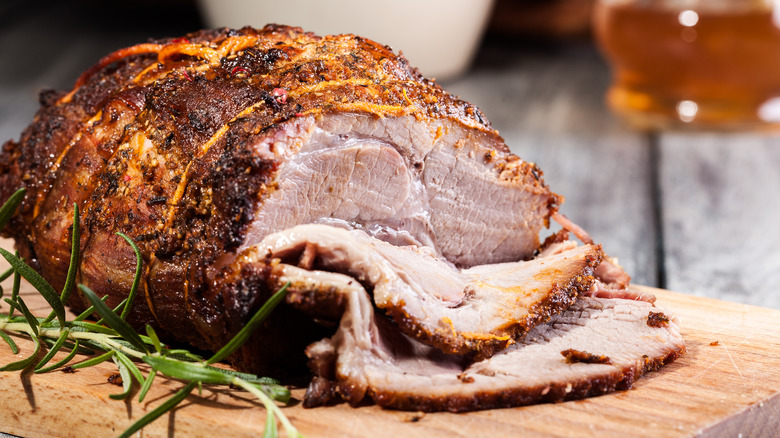
Fotek/Getty Images
In early 2018, New Orleans-area institutions got some unwelcome news about their Tasso Cajun Spicy Ham delivery. Louisiana-based Crescent City Meats had to recall the ready-to-eat ham after realizing it was, well, not actually ready to eat.
Undercooked ham can harbor some unwelcome dinner guests, like E. coli, Salmonella, Staphylococcus, and Listeria. It can also carry trichinella, a parasite sometimes found in pigs. Thanks to modern farming and inspection, trichinella is now less likely in U.S. pork. But the best defense is cooking ham thoroughly.
Unfortunately, that might not have happened for Tasso Cajun Spicy Ham, a bold, seasoned pork shoulder that's usually cooked through and ready to drop into a steaming pot of jambalaya, red beans, or gumbo. The recall applied to bulk institutional packages – 5-pound hams packed in 10-pound cases, not the retail packs you'd find in a grocery aisle. Crescent City Meats, known for their Cajun comfort foods like Smoked Pork & Alligator Sausage and Pork & Crawfish Sausage, took action to make sure the undercooked ham didn't land in anyone's pot. Cajun cooking is all about bold flavors and big personality, but it's best to ham it up with fully cooked meat.
Undeclared allergens in liquid eggs

HarryKiiM Stock/Shutterstock
In June of 2024, a paperboard carton mix-up led to the recall of nearly 5,000 pounds of liquid egg products. During a routine carton inventory check, Michael Foods Inc. realized something didn't quite add up. A bunch of 32-ounce cartons labeled "Fair Meadow Foundations Whole Eggs with Citric Acid" were missing. Meanwhile, the company had the same number of extra cartons for its Breakfast Blend Scrambled Egg product.
Turns out, the Breakfast Blend Scrambled Egg product went into the Whole Eggs cartons — an innocent enough mistake, unless you're allergic to milk. The Breakfast Blend contains milk, an allergen not listed on the Whole Eggs cartons. So, not only were the products mislabeled, but the wrong cartons also posed a safety issue.
As soon as Michael Foods Inc. discovered the mistake, the company notified the USDA's Food Safety and Inspection Service and scrambled to recall the product. The liquid eggs had already made their way to restaurants across nine states. Establishments with the mislabeled products were asked to throw them out or return them. Thankfully, no illnesses were reported, and the recall has since been closed. The mix-up certainly left Michael Foods Inc. with egg on its face, but the company handled the situation responsibly without cracking under pressure.
Mislabeled Armanino brand pasta sauce
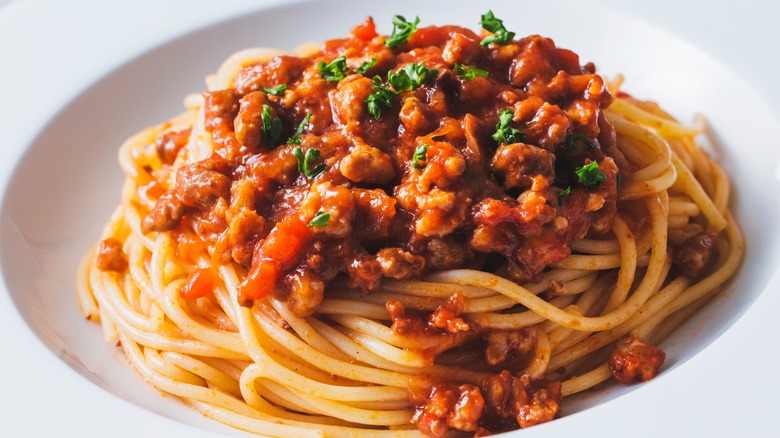
Nishihama/Shutterstock
Back in 2013, a labeling snafu forced Del Monaco Specialty Foods to recall over 5,500 pounds of Armanino Bolognese Sauce with Beef & Pork. The label forgot to mention one important ingredient — milk. That might just be fine print for some, but for those with dairy allergies, it's a critical detail. Luckily, no allergic reactions were reported, and both the USDA and Del Monaco Specialty Foods acted quickly to recall the mislabeled Armanino product.
Though Del Monaco Specialty Foods was acquired by Kettle Cuisine a few years after the recall, you'll still see Armanino sauces, pastas, and meatballs on grocery shelves nationwide. The 2013 hiccup, however, never reached supermarkets. The recall only impacted the foodservice line, specifically 7.5- and 12-pound cases destined for institutions in the San Francisco Bay Area. Today, well over a decade later, Armanino's Bolognese Sauce is still sold to restaurants looking for that slow-simmered, Sunday-at-Nonna's flavor — but with proper labels and no surprise ingredients.
Listeria contaminates chopped celery

FoodVideoPhoto/Shutterstock
In October 2010, Texas state health inspectors uncovered a serious problem at Sangar Produce and Processing, a food plant in San Antonio that packaged sealed produce for institutions like hospitals and schools. Testing of chopped celery revealed Listeria. Inspectors found the bacteria during an investigation into 10 cases of listeriosis across three Texas counties. Tragically, five of those cases ended in death, and six of the illnesses were directly linked to Sangar's chopped celery.
Health officials also noted troubling sanitation issues, such as a condensation leak above a food prep area, soil on work surfaces, and handwashing violations. Sangar's president pushed back on the findings, asserting that independent testing wasn't in line with the state's results and that the company maintained "an excellent health and safety record."
Sangar refused to close voluntarily, so the state stepped in and ordered the company to recall all products and cease operations until given approval to reopen. Because Sangar's produce wasn't sold in grocery stores, the recall didn't reach retail shelves. But health officials warned schools, hospitals, and restaurants to throw out the food immediately and not to try salvaging it by attempting to cook it to safety. The state shut down the Sangar facility under Texas law, which allows closures when conditions pose an immediate threat to human life or health. Unfortunately, Listeria fits that definition all too well, as it contributes to some of the most deadly food recalls in U.S. history.
E. coli scare in fresh and frozen beef products

guteksk7/Shutterstock
In late 2024, several people in Minnesota fell ill after eating burgers at restaurants around the Minneapolis area. State health officials, working with the USDA's Food Safety and Inspection Service, quickly launched an investigation. Their findings pointed to a familiar culprit — ground beef contaminated with E. coli.
The contaminated meat was traced back to Wolverine Packing Co., which responded by recalling nearly 170,000 pounds of ground beef. The recall covered hundreds of products, including everything from frozen burger patties and fresh Black Angus steakburgers to custom blends of ground chuck. This meat had been shipped to restaurants nationwide, and it all had to be thrown away.
Officially, over a dozen illnesses were confirmed. Realistically, the tally was likely higher, since mild cases often go unreported and many labs don't routinely test for E. coli. While even one mild case is too many, fast action by health officials and Wolverine Packing Co. minimized the spread of this outbreak, and the recall has since been closed.
Undeclared allergen in fully cooked frozen chicken

Tobik/Shutterstock
In 2019, Georgia-based Tip Top Poultry issued a small but important recall after a labeling mix-up. About 100 pounds of Gordon Choice frozen chicken went out under the guise of fully cooked, diced white chicken meat. A customer alerted the company after opening the package to find fully cooked grilled chicken breast strips instead. The issue wasn't just about accuracy. The grilled chicken also contained soy, a known allergen that was not declared on the product label.
The mislabeled chicken impacted 10-pound Gordon Choice cases shipped to restaurants, not your grocery freezer. In addition to restaurants, Gordon Choice makes its way to a wide variety of foodservice customers, such as cruise ships and correctional facilities.
Fortunately, no allergic reactions or illnesses were reported. The recall closed, leaving the mislabeled chicken as just a small chunk of Tip Top Poultry's 75-plus-year history. Undisclosed allergens are always a serious concern, but this recall was small and swift, keeping it off the list of the biggest chicken recalls in U.S. history.



